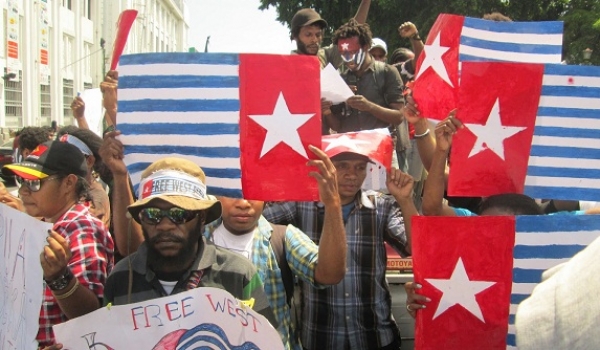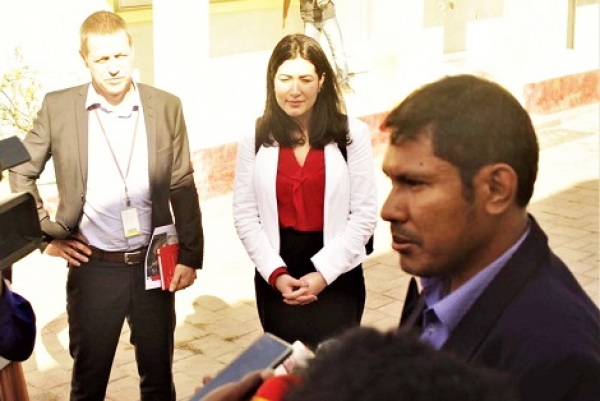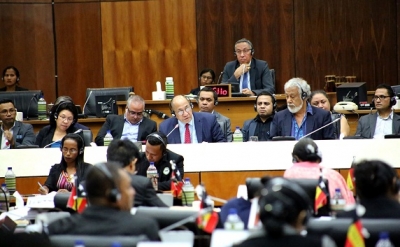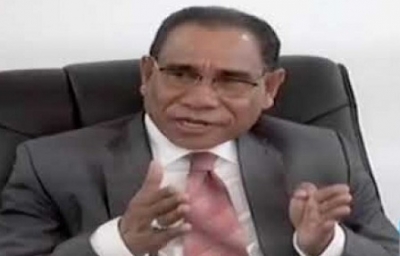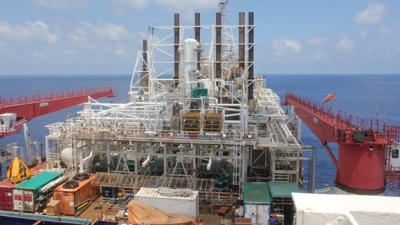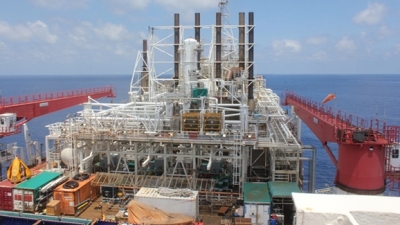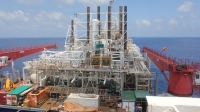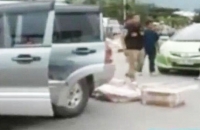
World (23)
Timor-Leste Police Arrest 46 West Papua Independence Protestors in Dili
DILI: Timor-Leste national police (PNTL) have arrested 46 students at a West Papua independence solidarity protest in Dili, amid accusations the group failed to get permission to hold their demonstration in public.
DILI: U.S energy group ConocoPhillips has said it will dismantle its Bayu Undan oil and gas platform in the Timor Sea by January 2022, when the oil and gas field is expected to become empty, Jose Lobato ConocoPhilip’s Timor-Leste Director said on Wednesday during a meeting with Prime Minister Taur Matan Ruak.
Parliament Passes Amendments to Allow Ratification of Maritime Border with Australia
DILI: Timor-Leste’s National Parliament voted in favour Tuesday of a legislative package that will allow ratification of a maritime border treaty with Australia.
The historic Border Treaty stipulates how the neighbouring countries will share oil and gas riches lying beneath the Timor- Sea.
Detained Timorese Drug Couple Face Tough Extradition Battle from Indonesia, Cárceres
DILI: A Timorese couple detained in Indonesia on allegation of drug smuggling into the country face a lengthy extradition battle that may not end well, Minister of Justice Manuel Cárceres da Costa, has said.
Drug trafficking in Indonesia is a crime punishable by execution under the country's tough smuggling laws.
Timor-Leste and Australia Set To Ratify Maritime Boundary Treaty on 30 August
DILI: The Governments of Timor-Leste and Australia are poised to conclude the ratification of the permanent maritime boundary treaty between the two countries on 30 August, Fidelis Mangalhaes the Minister of Legislative Reform Affairs (MRLAP) said.
Timor-Leste and Australia Set To Ratify Maritime Boundary Treaty on 30 August
DILI: The Governments of Timor-Leste and Australia are poised to conclude the ratification of the permanent maritime boundary treaty between the two countries on 30 August, Fidelis Mangalhaes the Minister of Legislative Reform Affairs (MRLAP) said.
DILI:Timor-Leste has completed its purchase of Royal Dutch Shell and ConocoPhillips’ stakes in the Greater Sunrise natural gas fields off the south coast of the country, the government said Tuesday.
The combined US$650 million transaction gives TIMOR GAP, the national oil company of Timor-Leste, a 56.56% interest in the Greater Sunrise Fields alongside continuing partners, Woodside (operator) with a 33.44% interest and Osaka Gas with 10%.
DILI: Indonesia’s Ambassador to Timor-Leste moved to reassure Timor-Leste’s security forces on Saturday that the Indonesian government was committed to working with Timor-Leste to stop illegal fishing and drug smuggling amid fears of porous borders attracting illegal activity.
Timor-Leste’s Global Corruption Ranking Declines
DILI: Timor-Leste has failed to maintain its improving ranking in a global measure of government corruption, dropping back three scores in 2018 after making steady progress until 2016.
DILI: Australia’s Foreign Minister Julie Bishop has rejected suggestions of bullying against Timor-Leste in oil and gas negotiations and says its time to “revitalise” the friendship during her visit to Timor-Leste.
More...
Ausralia - TL Prioritize Ratification of Agreement of Maritime Boundaries
DILI: Australia and TImor Leste are very supportive and want to ratify the signed Maritime Boundaries Agreement in March ago
DILI:Timor-Leste’s President Francisco “Lu Olo” Guterres will travel to Portugal this week to meet with the President and Prime Minister, Foreign Minister Dionísio Babo Soares said.
The three-day visit will include talks on expanding bilateral relations and signing an educational memorandum of understanding (MOU) to increase the current teacher support program.
Toxic Cost of Rubbish Scavenging in Timor-Leste
DILI:Smouldering fires. Haphazard explosions. Malnourished children. The disintegration of law and order and the absence of social services.
In 1999, images such as these sparked widespread public anger around the world and the dispatch of an international peacekeeping force to Timor-Lesteafter anarchy erupted following the country's independence referendum on leaving Indonesia.
But nearly two decades after peace was restored in Timor-Leste nothing much has changed at the Tibar landfill near the capital, Dili, where rubbish scavengers as young as eight years old eke out a living in unimaginable conditions.
The unregulated dumping ground for most of Dili's rubbish - including lethal asbestos and untreated hospital waste - the seven-acre site set in the belly of a steep valley is an environmental and public health catastrophe.
According to World Health Organization, "about 100 tonnes of hazardous wastes are produced every year in Dili from healthcare activities alone. As there is no centralised treatment or disposal facility available for such waste, they are quite often disposed [of] with municipal waste in Tibar".
The first thing that strikes visitors to the Tibar landfill are wafts of acrid black smoke released by fires set by scavengers to melt the plastic off items such as washing machines and chairs that can then be sold as scrap metal.
"The smoke really surprised me. It's surreal - a 24/7 smouldering heap," says Chris Kaley, a tourist from Australia who visited the landfill with Bruce Logan, the Australian co-owner of Dili's Beachside Hotel.
"I come here once or twice a week to dump rubbish. I also bring any of our guests who are interested in seeing how the other half live," Logan says. "I call it the 'stop-your-whingeing tour' because coming here gives you a reality check about the trivial things people complain about in Australia."
The moment Logan parks his utility vehicle, a group of 20-odd scavengers dressed in torn filthy rags raid the bags of rubbish stacked on his vehicle's tray.
Among them is Domingos, a 61-year-old man working at the landfill for six months. "The valuable things are bottles and cans," he says. "If I collect a big pile of cans, I can sell it for $1."
There are also children in the group, including an eight-year-old girl named Vanya who lives just outside the dump. She says she has been working here all her life.
"I like it here because I can be with my parents and friends," she says.
Vanya claims she attends school, but when asked why she isn't there at that moment, she does not reply.
On the edge of the valley, we speak to Magdalena, a 70-year-old woman working at the landfill since 2006 who sleeps under a corrugated iron sheet supported by four short posts.
Her shanty conflicts with information offered by an employee of the sanitation department working onsite, who said on condition of anonymity, "it is not allowed for people to live inside" the landfill. He's also the only individual interviewed at the site who claims to earn a living wage - albeit a paltry sum of US$150 per month.
On the other end of the spectrum, Magdalena claims to earn no income at all despite efforts to sell scrap metal for US$2 per pile. "I don't make any money," she says. "I can't remember the last time I sold anything.
"Magdalena says the government doesn't offer any kind of assistance to scavengers at Tibar, but that a number of NGOs have come here over the years to offer jobs on the outside. "I never got one," she says. "Only some other people did."
London-based Small Steps Project is among the many NGOs that have tried - and apparently failed - to make a difference at Tibar.
According to the group's website, it previously distributed food, water and shoes to 130 children living in the area and assisted "two large families who desperately needed food, cooking tools, cutlery and plates". But the programme is "no longer active".
The Ryder Cheshire Foundation, another NGO, previously provided "medical support for emergencies on the site". But there is no evidence of healthcare at Tibar today.
"I am sick. We are all sick. We have coughs," says rubbish scavenger Maria. "When it hurts we go to the hospital to get medicine. Then we come back to work."
Adds Aliso, a 55-year-old man working at Tibar since 2004. "I am sick all of the time from the smoke. I have a cough. During the day it's okay, but it hurts more at night."
Making the best of it
Despite the dangerous and unprofitable nature of rubbish scavenging at Tibar, many of those who work here claim they are satisfied with their lot.
"I like my job because no one bosses me around," says the sanitation department employee.Domingos the scavenger adds: "This is our place. We help each other. We collect food for pigs. Sometimes, we also find treasure buried here."
"It may look like a war zone, but I did not feel an extreme sense that the people here were helpless," says Chris Kaley from Australia. "Somehow they all survive."
Masa Oki is a truck driver from Dili dumping rubbish at the site. "This is their habit. It's not for us to say if it's good or bad. I think it would be difficult to get them to leave this place."
But the World Health Organization says improvements are required.
"Institutional arrangements for solid waste management in Dili need strengthening with necessary logistics and manpower support. Dumping site at Tibar needs an urgent upgrading from the current crude dumping to a controlled tipping situation."
Timor-Leste Women Join ASEAN Voice Denouncing Sexual Violence
DILI - Timor-Leste’s women groups have joined a group of ASEAN female voices calling for an end to sexual violence against women and girls in the region.




